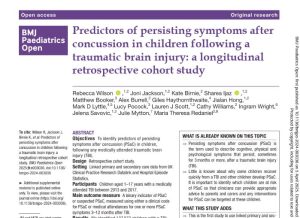Identifying risk factors for persistent symptoms after concussion in children
9 April 2025
The risk factors for persisting symptoms after concussion, including age, ethnicity and gender, have been revealed in a new paper published in BMJ Paediatrics Open. The study, led by NIHR ARC West researchers, looked at routinely collected GP practice and hospital data between 2013-17.
In persisting symptoms after concussion, people experience a variety of problems for a prolonged period after a blow to the head or other violent event (a ‘traumatic brain injury’).
Up to half of such head injuries are in children aged under 16. Most recover completely but a small proportion experience persistent symptoms including headaches and dizziness, or changes to emotions and behaviour, or impaired ability to think and learn.
The team were looking at data for children aged between one and 17 years with a traumatic brain injury, who attended a medical service. The children needed to have either been identified as having been diagnosed with ‘post-concussion syndrome’ or have one or more symptoms of it 3-12 months after the injury.
They identified 137,873 children with traumatic brain injury. Of those, 3.4 per cent had persisting symptoms.
Risk factors for having persisting symptoms included:
-
- Being female: 3.8% of girls vs 3.1% of boys
- Being older: on average, children with persisting symptoms were eight, while other children with traumatic brain injury were five and a half years old
- Being Asian or mixed ethnicity
- Having a history of:
- Headaches
- Learning disabilities
- ADHD
- Anxiety
- Depression
- Sleep disorders
Dr Julie Mytton, Professor of Child Health at the University of the West of England, Bristol, and joint senior author on the study, said:
“If we can identify who is at greater risk of persisting symptoms after concussion, we can put measures in place to support them. We’re still not sure whether the risk factors we’ve identified cause significant problems or not. But this is an important first step in predicting those at most risk.”
Paper
